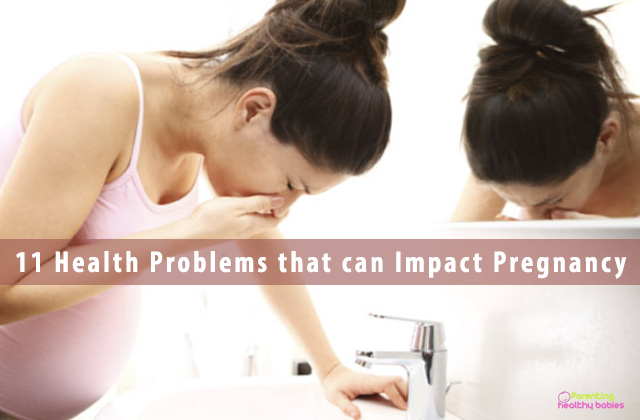Breathe, take child birth classes, think about postpartum depression, breastfeeding, choosing a paediatrician, avoiding big meals, pre-wash baby’s clothes, install car seat for the baby, stack meals, packing your bag and birth plan are some of the must do things before labor.
What is labor pain?
Labour pain[i] is a recurrent pain felt by a woman before or during childbirth. It starts towards the end of the pregnancy period as a sign that the baby is ready to come out.
Labour has three stages:
- The first stage is when the neck of the womb (cervix) opens up to 10 cm. This stage can last from 6-36 hours. The cervix is long and firm. However, during the first hours of labour the muscles of the uterus contract and help to soften the cervix so that it can dilate easily. During this period, the mothers experience contractions. Initially the contractions will be short (30-40 seconds) and irregular. Once they are five minutes apart and a minute or more long, labour is considered to be “established “. The amniotic sac around the baby gets ruptured. This is also known as ‘breaking of waters‘. The discharge of a plug of mucus which may be thick and stringy or blood tinged happens during the labour period.
- The second stage is when the baby moves down the vagina and is born. The mother’s job is to push the baby through the birth canal and requires determination and energy. It takes approximately 30 minutes to 1 hour for a normal childbirth.
- The third stage is when the placenta is delivered (afterbirth). There are two ways in which it can happen- the physiological management and the active management. In the first place,the placenta is delivered spontaneously with effort. In the second case, a drug is injected to speed up the placental separation and the uterus contracts down to reduce blood loss.
Most Common Signs of labour pain
The main signs and symptoms of labour pain are listed below:
- Persistent lower back pain or abdominal pain with cramps.
- Irregular painful contractions.
- Broken waters.
- Brownish tinged mucus discharge.
- Upset tummy or loose bowels.
- Mood swings, restlessness and anxiety.
- Disrupted sleep patterns.
11 Things You Must Do Before Labor
Breathe
New worries about pregnancy and future may keep a would be mother awake at night. Many women report poor sleep quality or no sleep at all. Women tend to overthink which makes them exhausted and disturb their sleep pattern. At night, they lie awake mostly due to the worrying thoughts which get magnified at night. One of the best ways to deal with this is to take deep breaths and think about things which give happiness and comfort.
Take child birth classes
Child birth classes are necessary because a would be mother get’s an insight into how to handle labour and what happens during that time rather than panic in an unknown situation. It also teaches the primary duties of the mother after childbirth. These classes also teach how to tackle complicated situations during labour and childbirth.
Think about postpartum depression
Postpartum depression occurs a few weeks after child birth. If one has a history of depression or anxiety or even postpartum depression there may be some risk. However, this can be prevented by speaking to the therapist and learning about the symptoms of this depression and making plans to deal with it.
Breastfeeding
Although breastfeeding comes naturally after child birth, it’s not always easy. It is advised to take class and consult on how to breastfeed and plan on how one’s spouse can help in this. However less it maybe in the initial stage, any amount of breast milk that the baby will get is beneficial.
Choosing a paediatrician
It is good to visit a paediatrician before child birth and know about the duties towards the child after it is born. This may include vaccines, antibiotics, baby’s sleep, food etc.
Avoiding big meals
During labour it is advised not to over eat or eat unhealthy. Since there are chances of vomiting during labour, it is safe to have small meals and plenty of water to stay hydrated and energised for the delivery.
Pre-wash baby’s clothes
Pre-washing baby’s clothes may help to reduce the work load during the first weeks after childbirth. This will also keep the baby safe from any outside diseases. It is advised to use antiseptic liquids in washing baby’s clothes.
Install car seat for the baby
It is important to install the car seat for the baby and get it checked by a professional. Most hospitals do not allow the baby to leave unless they check about the car seat.
Stack meals
This helps in the initial weeks after child birth when the mother is needed almost every time by the child. Stored foods and vegetables or ready to eat foods help a good deal in reducing work and getting more baby time.
Packing your bag
Since the time of delivery is not known, it is safe to keep the bags packed and ready beforehand and not wait till the last minute. This gives a sense of relief, preparedness and ease.
Birth plan
Although hospitals provide with a baby birth plan but it is always special for a mother to have her own plans on how she wants her labour to go, what she wants to do for her baby, the celebration she expects. There small wishes give her happiness during labour and delivery.
These are some of the things new parents should do before going into labour and delivery. These not only enhance a safe happy motherhood but also full care to the baby during the most crucial months.













